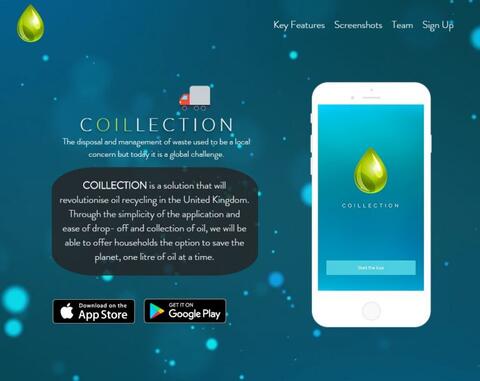In late 2017, a Chinese aircraft flew to the US from China using fuel blended from cooking oil.
Just a month earlier, Yin Noe (MSc Innovation, Entrepreneurship & Management 2018) had arrived in London to study at Imperial College Business School.
Born in Myanmar and raised in Singapore, she had just completed a degree in Computer Sciences in Scotland. She had a passion for designing new technologies and the technical skills to make it happen. Now she wanted to learn how to apply them in the real world.
“The programme at Imperial was perfect for me,” Yin says. “It combined economics, accounting, venture capital, marketing, entrepreneurship and so much more.”
The opportunity to study in London made it impossible to resist because, she says, “it is the European hub for tech start-ups and offers so many opportunities”.
Yin always knew she wanted to start her own business. However, she thought it would be a long, hard road and believed her dream would take many years to become a reality.
Design thinking
That all changed thanks to a single module offered by Imperial. Design Thinking for Innovation requires students to work in teams to develop a new business idea. They then refine it through a series of pitches to investors, consultants, incubators and entrepreneurs.
Yin’s team was a multicultural mix of students from a range of academic backgrounds, including engineering, psychology and computer science. She believes it was this unique combination that enabled them to hit on a winning idea.
“We had a shared interest in sustainability, and so wanted to work on an idea that involved turning waste into something more,” she explains.“We started speaking to large, ethnic families in the local area and discovered that they can discard up to five litres of cooking oil every week. It just gets thrown down the sink, where it blocks up the pipes.”
Here was an opportunity to solve several problems: to reduce oil waste, prevent clogged pipes and find a new renewable energy source. That US-China flight had shown cooking oil might be a fuel of the future. Yin and her team were keen to see how they could help UK households be part of the biofuel revolution.
“We were able to work on the idea across a range of our modules,” Yin says. “In Marketing we’d think about the brand, in Accounting we’d look at our financial projections, and the Entrepreneurship module helped us to discover what it is really like to run your own business.”

Stepping stone
From there, Coillection was born. Starting with 20 households, they began offering incentives for people to collect their used oil. Through an online platform they arranged door-to-door collection of the oil, which can then be converted into biodiesel.
Throughout the process they were coached by academics, investors and consultants. Yin says this was invaluable: “Having people older and wiser than us who really believed in us made us think that maybe we really could do it.”
This gave them the confidence to start applying for the various competitions run by Imperial College Business School and Imperial Enterprise Lab. Despite initially being unsuccessful, they kept trying. Finally, in the middle of exams and summer projects, they were offered a place in the 2018 Imperial Business Pitch competition.
After several weeks of coaching from successful accelerator and startup professionals, they gave their pitch – and won.
“It was amazing,” Yin says. “Imperial was really the stepping stone for us. It made me believe that it was possible for us to run our own business without having to wait until we’d gained years of experience.”
Into the real world
After the programme finished, Yin and her teammates continued working on the project alongside corporate jobs. But after several months at a venture capital firm, Yin left in order to work on Coillection full time.
The next step involves building partnerships with local schools. Coillection will use the schools as oil collection points, and also offer an education programme for students.
Yin also hopes they can attract further investment from water companies, who spend millions of pounds each year clearing pipes that become clogged with cooking oil.
There is an app in development, and from there Yin has global ambitions. While there are schemes in the UK to collect waste cooking oil from restaurants and commercial kitchens, this is not the case in many other countries.
Imperial College Business School offered me a silver platter of knowledge. Now I am taking it into the real world and seeing where it takes me.
“My advice for anyone who wants to do the same is to put yourself out there. Even if you are shy, go and talk to people. Meet people from other cultures and backgrounds. Make connections. Take every opportunity offered to you.”
And most of all, Yin hopes you’ll never look at the oil left in the bottom of your frying pan in the same way again.
Would you like to get involved and share your story with the Imperial community? Then here’s how:
Use #ImperialMeansBusiness on social media to share:
- Your proudest Imperial moment
- Your workplace, and how Imperial got you there
- The alumni connections you’ve made
- How your alumni community has supported you
- Your entrepreneurial expertise
- Anything else that makes you proud to be a part of the community
